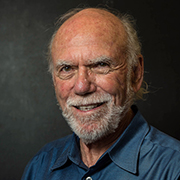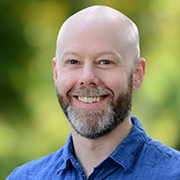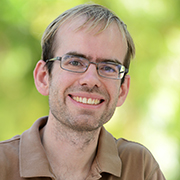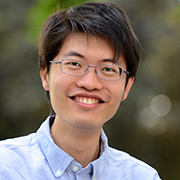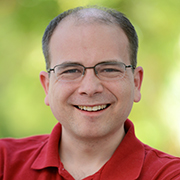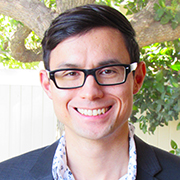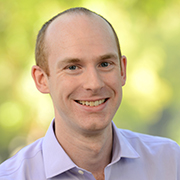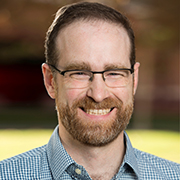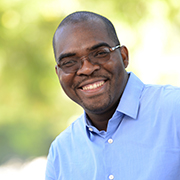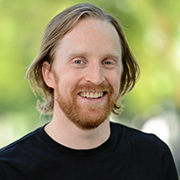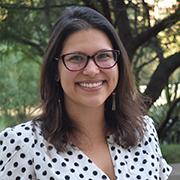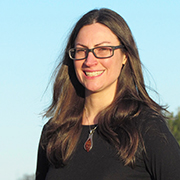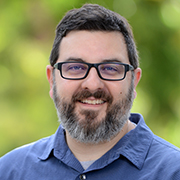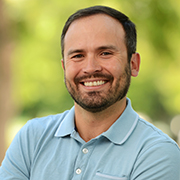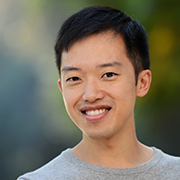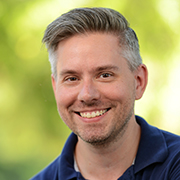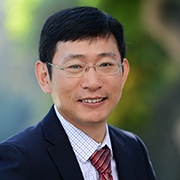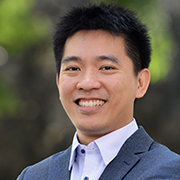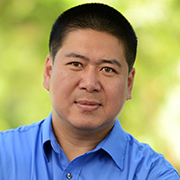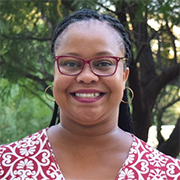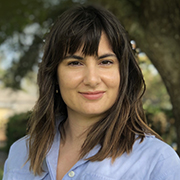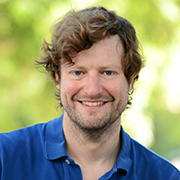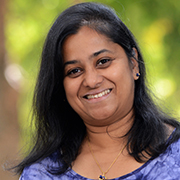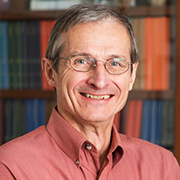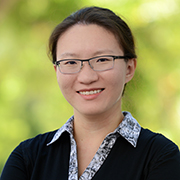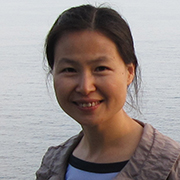
Meet the newest faculty members in the College of Natural and Agricultural Sciences for 2018
Also see pictures from the 2018 New Faculty Reception.
Barry Barrish
Barry Barrish, distinguished professor of physics in the Department of Physics and Astronomy, earned his Ph.D. in Experimental Particle Physics at the University of California, Berkeley. His research effort has been focused on the Laser Interferometer Gravitational-Wave Observatory (LIGO) since he became Principal Investigator in 1994 and Director in 1997. His work on the LIGO project was awarded the 2017 Nobel Prize in Physics for the first direct observation of gravitational waves.
John Barton
John Barton is an assistant professor in the Department of Physics and Astronomy. He earned his Ph.D. in Physics at Rutgers University and performed his postdoctoral work at the Massachusetts Institute of Technology. His research interests are in the area of theoretical biophysics, with a specific emphasis on problems in immunology and the evolution of viruses. He applies methods from statistical physics to interpret experimental data and to model the interactions between highly mutable pathogens, such as HIV, and their human hosts.
Simeon Bird
Simeon Bird, assistant professor in the Department of Physics and Astronomy, earned his Ph.D. from the University of Cambridge and did postdocs in the IAS at Princeton, Carnegie Mellon and Johns Hopkins. His research interests are in cosmology and galaxy formation. His tool of choice is numerical simulations, so he is interested in high performance computing, as well as machine learning.
Yat Tin Chow
Yat Tin Chow is an assistant professor in the Department of Mathematics. He received his Ph.D. in Mathematics from the Chinese University of Hong Kong. He comes to UC Riverside after being a CAM assistant adjunct professor in Department of Mathematics in UCLA. His major research direction is applied mathematics. His current research interests include computations of control methods and conflict modeling in high dimensional systems, transportation plans and games between large populations. Moreover, he works on both theoretical and numerical aspects of large scale optimization methods. He is also interested in computational methods of medical imaging from boundary measurements of various physical quantities, e.g. electric current, acoustic wave, light intensity, etc.
Kevin Costello
Kevin Costello, LSOE in Mathematics, earned his Ph.D. in Mathematics from Rutgers University. He was previously an assistant professor at UCR, where he was awarded the Junior Excellence in Teaching award in 2017. His research lies at the boundary of probability, discrete mathematics, and computer science, with a particular interest in algorithms (randomized and otherwise) for graphs and networks and the structure of large random objects such has random matrices.
Anson D'Aloisio
Anson D’Aloisio is an assistant professor in the Physics & Astronomy Department. He is a UC Riverside alum (class of 2005) and is thrilled to be back as a faculty member. He received his Ph.D. in Physics at Yale University. Anson’s research interests fall broadly into the realm of theoretical astrophysics and cosmology. He uses computer simulations of cosmological structure formation to understand the origin story of our Universe.
James Davies
James Davies, assistant professor of chemistry in the Department of Chemistry, earned his Ph.D. in chemistry at Bristol University, UK and completed a postdoc at the Lawrence Berkeley National Laboratory. His research explores the physical and chemical properties of aerosol using single particle levitation techniques developed in his laboratory. He is particularly interested in the role of liquid-vapor interfaces in regulating the chemical reactivity and transformations of atmospheric particles, and seeks to better understand the role of aerosol in the environment, their effect on clouds and climate, and their influence on human health.
Patrick Degnan
Patrick Degnan, assistant professor in the Department of Microbiology and Plant Pathology, completed his Ph.D. in Ecology and Evolutionary Biology at the University of Arizona. His research group focuses on the mechanisms that contribute to the assembly, maintenance and restoration of healthy human gut microbial communities using a variety of computational genomic and experimental approaches including anaerobic cultivation and genetic manipulation of human gut microbes. Current work in his lab is examining the role of RNA regulators influencing metabolic versatility of gut microbes and the consequences of horizontal gene exchange among co-resident microbes.
Roby Douilly
Roby Douilly, assistant professor of seismology in the Department of Earth Sciences, earned his Ph.D. in Geophysics at Purdue University. His research interests are in the areas of crustal seismology, seismic tomography, earthquake source mechanisms, rupture dynamic and earthquake strong ground motion. He works on understanding the structure of the Earth’s crust through the use of seismic imaging techniques and on investigating the effects of fault geometry and background stress on earthquake rupture propagation using computational models.
Matthew Durham
Matthew Durham, assistant professor of mathematics in the Department of Mathematics, earned his Ph.D. in mathematics at the University of Illinois at Chicago. His research involves studying the interactions between group theory, low dimensional topology, and metric geometry, especially in 2 and 3 dimensions. He is particularly interested in the geometry of mapping class groups and Teichmüller spaces of surfaces, especially their connections to surface bundles and hyperbolic 3-manifolds. His work has also focused on coarse nonpositive curvature phenomena in the setting of geometric group theory.
Sydney Glassman
Sydney Glassman, assistant professor in the Department of Microbiology and Plant Pathology, earned her Ph.D. in Environmental Science, Policy and Management at UC Berkeley. She completed her bachelors in Biology and masters of Environmental Studies at the University of Pennsylvania. Her research focuses on understanding patterns and processes governing microbial diversity, and their ecosystem functions such as terrestrial symbioses and decomposition. She is very interested in how disturbances such as wildfires affect microbial communities and how fungal-bacterial and fungal-plant interactions shape litter decomposition and terrestrial symbioses.
Allison Hansen
Allison Hansen, assistant professor of entomology, transferred her laboratory to University of California, Riverside on January 1, 2018 from University of Illinois, Urbana-Champaign. She conducted a postdoctoral fellowship under Dr. Nancy Moran at Yale University. The focus of her research program is on the evolution and ecology of insect-microbe interactions. Her lab teases apart the molecular mechanisms that underpin insect-microbe co-evolution using comparative and functional genomics in an evolutionary framework.
Daniel Hirmas
Daniel Hirmas, associate professor of pedology in the Department of Environmental Sciences, earned his Ph.D. in Soil and Water Sciences at UCR. His research interests are in the areas of soil genesis, quantitative pedology, soil-landform dynamics, soil hydrology, and dust transport and deposition. His research is conducted at a variety of scales ranging from individual soil pores to the continent and involves the application of field- and laboratory-based 3-D laser scanning, proximal sensing, and rapid fabrication methods along with the analysis of big data to understand and model the evolution of soil properties and their effect on the retention and flux of water through the vadose zone.
Pete Homyak
Pete Homyak, assistant professor of ecosystem & soil microbial processes in the Department of Environmental Sciences, earned his Ph.D. in soil and water sciences at UCR. His research evaluates interactions between microbes and the soil physical environment (e.g., the implications of how microbes respond to physical stress), while focusing on the exchange of elements (e.g., C, N, and P) across the soil–atmosphere and soil–water interfaces.
Kevin Kou
Kevin Kou, assistant professor of chemistry in the Department of Chemistry, received his Ph.D. in Chemistry at the University of Toronto. He was a visiting scholar at UC Irvine and an NSERC postdoctoral fellow at UC Berkeley. His research interests at UC Riverside are in exploring new concepts for organic chemistry and their applications to synthesizing natural products that impact human health.
Thomas E. Kuhlman
Thomas E. Kuhlman, assistant professor of physics in the Department of Physics and Astronomy, earned his Ph.D. in physics at the University of California San Diego, and was previously an assistant professor of physics and biophysics at the University of Illinois Urbana-Champaign and an Alfred P. Sloan Research Fellow of Physics. His research interests are in the areas of molecular biology, microbiology, quantitative imaging, and theoretical modeling of biological systems. He works on genome dynamics, quantification of the activity of transposable elements in live cells, and applications to the engineering of genome editing systems.
Yehua Li
Yehua Li, professor of statistics, earned his Ph.D. in statistics from Texas A&M University in 2006. Before joining UCR, he held faculty positions as assistant professor at the University of Georgia and associate professor at the Iowa State University. His methodology research interests include big data analytic, nonparametric and semiparametric statistics, longitudinal and functional data analysis, spatial data, time series, mixture model, and measurement error. He is also interested in statistical applications in areas such as brain image data analysis, Alzheimer studies, substance abuse treatment, joint modeling of longitudinal data and survival outcomes and various applications in plant science. He received a NSF CAREER Award in 2012 and is currently serving on the editorial board of two statistical journals.
King-Fai Li
King-Fai Li, assistant professor of environmental science/statistics in the Department
of Environmental Science, earned his Ph.D. in Environmental Science and Engineering at the California Institute of Technology. His research interests are in the areas of numerical analysis, scientific computing, atmospheric chemistry and dynamics, climate, and planetary science. He works on decadal climate variability, Sun-climate interactions, stratospheric / mesospheric ozone chemistry, and Arctic sea fog detection.
Wei Liu
Wei Liu, assistant professor of climate change and sustainability in the Department of Earth Sciences, earned his Ph.D. in Atmospheric and Oceanic Sciences at University of Wisconsin-Madison. His research interests are in the areas of physical oceanography, climate dynamics and paleoclimate. He combines observation and model to explore the role of ocean in climate change and climate variability.
Juliet Morrison
Juliet Morrison is an assistant professor in the Department of Microbiology and Plant Pathology. She earned her Ph.D. in Microbiology at Columbia University, and has spent over fifteen years studying innate immune responses to viral pathogens such as dengue virus, yellow fever virus, poliovirus, and influenza virus. She specializes in combining computational analysis with immunological and virological methods to address questions at the host-pathogen interface. A major interest of the Morrison lab is studying the dynamics of lung immune cell populations during influenza virus infections, and spleen and liver immune cell populations during flavivirus infections. Her goal is to translate her findings into host-targeted influenza and flavivirus therapeutics.
Monique Rivera
Monique Rivera, assistant cooperative extension specialist in the Department of Entomology, earned her Ph.D. in entomology at Rutgers University. Her research interests are plant-insect interactions, community ecology, and integrated pest management in subtropical agroecosystems. She works alongside growers and other faculty members to answer both applied and basic questions relevant to California subtropical cropping systems with a special focus on citrus and avocado.
Peter Samuelson
Peter Samuelson, assistant professor of mathematics in the Department of Mathematics, earned his Ph.D. in mathematics at Cornell University, after an undergrad degree at Caltech. His research interests in general are representation theory and low dimensional topology. A sample of topics he has worked on includes skein theory, Hall algebras, character varieties, Fukaya categories of surfaces, Heisenberg categorification, Hecke algebras, and Macdonald polynomials.
Viji Santhakumar
Viji Santhakumar, associate professor of neuroscience in the Department of Molecular, Cell and Systems Biology, earned her MBBS in India and Ph.D. in neuroscience at the University of California at Irvine. Following postdoctoral research at UCLA, she was a faculty at Rutgers Biomedical and Health Sciences before moving to UCR. Her research interests are in the areas of physiological mechanisms of pathology in traumatic brain injury and epilepsy with a focus on inhibitory circuits, synaptic physiology and network computational analysis. Her lab is pursuing novel directions examining the role of neuro-immune interactions and neurogenesis in development of neurocognitive dysfunction after brain injury.
Richard Schrock
Richard Schrock, distinguished professor of chemistry and the George K. Helmkamp Founder’s Chair in the Department of Chemistry, obtained his Ph.D. degree at Harvard University. His research interests include inorganic and organometallic chemistry of high oxidation state metal complexes, catalytic reactions and mechanisms of reactions involving alkylidene complexes, especially olefin metathesis reactions, and controlled synthesis of polymers prepared using well-defined organometallic initiators. His catalytic reactions are widely used in chemical industry for efficient and environmentally friendly production of pharmaceuticals, fuels, synthetic fibers, and many other products. He was awarded the Nobel Prize in Chemistry in 2005.
Qixuan Wang
Qixuan Wang, assistant professor in the Department of Mathematics, earned her Ph.D. in mathematics at University of Minnesota, Twin Cities and comes to Riverside after postdoctoral work at University of California, Irvine. Her research interests are in the areas of mathematical modeling and scientific computing. Her recent works include multi-scale modeling of tissue development and amoeboid cell swimming.
Shuheng Zhou
Shuheng Zhou is an associate professor of statistics at University of California, Riverside. She received her Ph.D. degree from Carnegie Mellon University in Electrical and Computer Engineering in 2006. Her research interests are in high-dimensional statistics, graphical models, errors-in-variables, privacy, statistical machine learning theory, algorithms and optimization. She enjoys dealing with large, complex, and incomplete matrix and tensor data, arising from biological and neuroscience applications.
